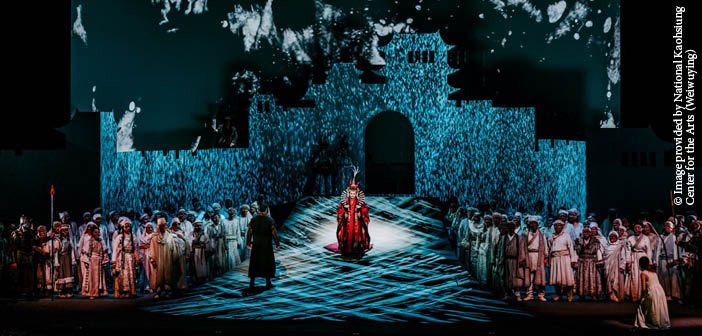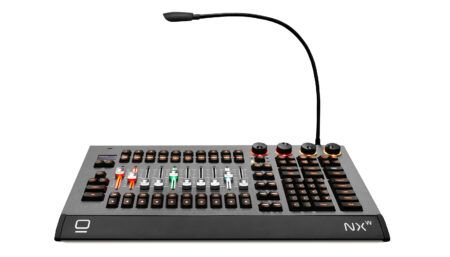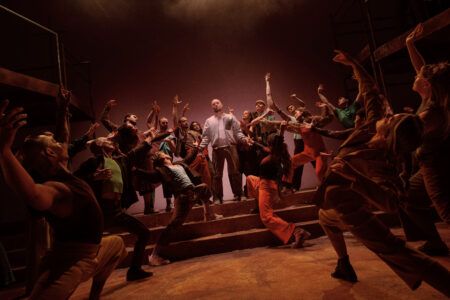Taiwan’s National Kaohsiung Center for the Arts (Weiwuying) hosted a revival of the German/Taiwanese co-production of Puccini’s Turandot earlier in 2020. Chien-hao Kuo, the lighting designer and head of lighting, chose to replace the original design’s discharge moving lights with LED fixtures.
He selected 26 Ayrton Khamsin-S profiles, which were supplied to the venue from rental stock by Hispot Workshop of Taipei, Taiwan. The company has been dedicated to theatre design and equipment rental for more than 26 years. Kuo’s choice was a considered one, as he had used Ayrton Khamsin-S on several operas in the past.
“Because opera singers perform without amplified sound, I was focused on methods of reducing the background noise in the theatre,” he explained. “Moving lights with discharge sources are notorious for having fans, the noise of which causes disturbance in this kind of performance.”
An LED lighting source was therefore the way to go, but without compromise to performance or versatility.
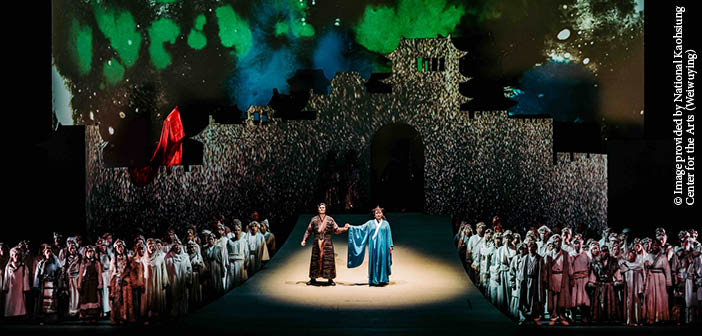
Versatile functionality
“I knew from experience that the Khamsin-S is a very versatile fixture: it is fully equipped with everything you need, whether used as a spot or a wash, and has great gobo projection,” said Kuo. “I knew that, as long as I had all Ayrton Khamsin units hung on all the grids, I would never have to worry about anything the director requested during tech time! Ayrton Khamsin-S can reproduce any picture in my imagination very rapidly, and I can even use its graphic animation effect wheel to simulate various video effects.”
Ayrton Khamsin-S played a pivotal role in Kuo’s design by creating leading image effects and using the gobo flow to match media content. “I kept the fixtures busy in colour changing, gobo rotating and graphic animation,” he said. “All functions were set to work for hours, and we never had to reset the system when the show was in process.”
Reliability was also important because the stage set design included a semi-circular cyclorama and central slope. “Because of these stage features, once the lights were rigged, it would be difficult to access them for any further readjustment,” said Kuo. “We therefore decided that all the overheads would be Khamsin-S moving lights, because it is a very stable fixture. Once they were rigged above the stage, it was very easy to achieve both clean shutter cuts and smooth washes.”
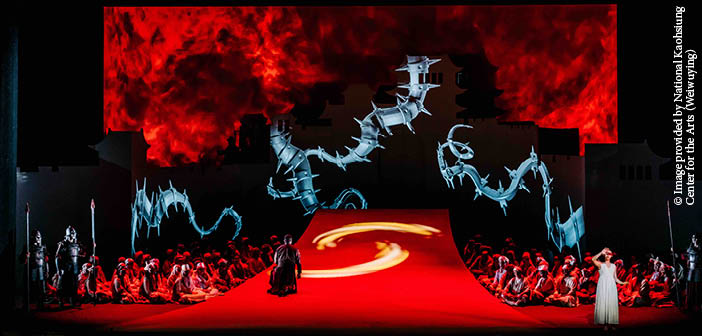
Fine adjustments
Ayrton Khamsin-S is brighter than the original fixtures, and the LED lighting colours are different from those in the discharge units. Kuo thus took time to adjust the intensity and colours to correspond with the original look of the production. “In this production, digital media took up the largest proportion of the design, with the lighting forming a balance between the stage and video concepts. Khamsin’s electronic dimmer is very precise and allowed me to make fine adjustments that created a proper bridge between the two.”
National Kaohsiung Center for the Arts (Weiwuying) is a wave-shaped, 3.3-hectare building. It provided a majestic setting for this internationally popular, classic opera.
The original co-production was by the National Kaohsiung Center for the Arts (Weiwuying) and Deutsche Operam Rhein. It premiered in Theater Duisburg, Germany, in December 2015, before making its Asian premiere at the Weiwuying Opera House in April 2019. The lighting design was a joint creation between Volker Weinhart for Germany and Kuo for Taiwan.
This latest revival in August 2020 enjoyed huge success. A simultaneous live broadcast on Weiwuying’s official YouTube channel also allowed 50,000 people across the world to enjoy the experience together.
Images provided by National Kaohsiung Center for the Arts (Weiwuying)
Click here to read about the venue in the Auditoria Annual 2018/19 edition.


